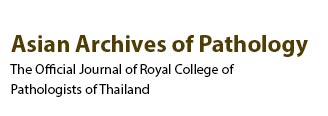[OA-11] Appropriate use of thrombophilia panels testing
Jirakit Sattayapornpipat, Preechaya Wongkrajang and Panutsaya Tientadakol
Department of Clinical Pathology, Facolty of Medicine Siriraj Hospital, Mahidol University, Bangkok, Thailand
Thrombophilia can be hereditary or acquired. Thrombophilia testing may help making decisions in prevention and treatment in thrombophilia patients. The aim of this study was to evaluate the inappropriate use of the thrombophilia testing both hereditary [protein S (PS), protein C (PC) and antithrombin activity (AT)] and acquired [antiphospholipid syndrome - lupus anticoagolant (LA), anti-beta-2 glycoprotein 1 antibody (aB2GP1 Ab) and anti-cardiolipin antibody (aCL Ab)]. A total of 4,768 tests of PS, PC, AT, LA, aB2GP1 Ab, aCL Ab from Siriraj hospital were retrospectively reviewed using the indication for ordering the tests. The inappropriate rate of the hereditary thrombophilia test orders were 75.81% (188/248), 77.78% (182/234) and 76.97% (137/178) for PS, PC and AT, respectively. On the contrary, acquired thrombophilia test orders were less than 50%, 43.23% (287/664), 42.75% (282/660) and 8.58% (29/338) for aB2GP1 Ab, aCL Ab and LA, respectively. The most common cause of inappropriateness for hereditary thrombophilia test orders was age more than 50 years old (38.37%) and the second most common was testing during acute thrombosis (37.66%). In conclusion, there are many factors influencing the thrombophilia testing orders, so education is the key to utilise the tests.
Keywords: anti-phospholipid antibody; lupus anticoagolant; protein C; protein S; thrombophilia


